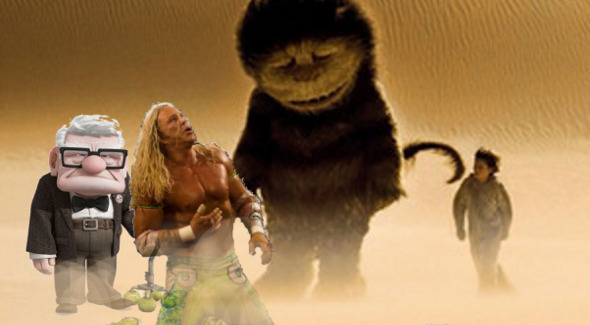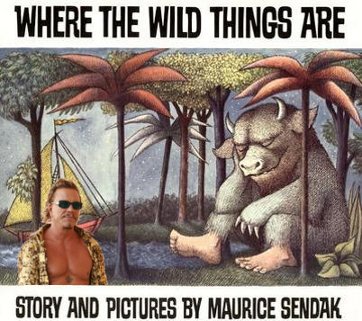In the book, little Max is upset, but he’s not really upset. The book doesn’t waste precious pages giving him lots of specific things to be upset about, and the wild things reflect this by themselves being a menagerie of isolated images. Maurice Sendak, the author (who was a producer on the movie and endorses the book-to-movie conversion with more vigor than I’ve seen from an author since Howard Stern was pitching Private Parts) modeled them after his extended family, so there is some detail and a suggestion they are part pure imagination, part reflection of real people, but it’s just a suggestion. The wild things in the book are visually compelling and expressive — they have a lot of personality, but they don’t have their own stories.
In the movie, little Max is really upset, and he’s upset about a bunch of specific things. He’s also awash with other emotions. The first 20 minutes of the movie play out like the opening to a Harold (a popular long-form improvisational format played frequently by, among other people, me) — Max encounters a bunch of emotionally charged scenarios IRL, then the rest of the movie goes on a rambling journey through the subconscious implications of all this, drawing on images, motifs, characters and themes from the opening to build out the rest of what happens, with an idea of finding essential truths behind the ideas expressed at the beginning.
The wild things are also hooked into Max’s emotional life — each one represents aspects of Max’s experience of the world, people Max knows, and emotions Max feels in complex synthesis. One wild thing is the “ignored Max” — a small, sheepish (literally a ram) fellow nobody listens to who just wants to be acknowledged. Another wild thing is “the object of Max’s love for his sister and mother.” A third is “Max’s idealization of his unmet need for friendship.” A fourth is “Forrest Whitaker voices a Jewish stereotype.” Yeah, that one I haven’t quite figured out.
(Actually, I have — “Ira” is an amalgam of somebody from Max’s memory whom we do not meet in the opening, probably an uncle or grandfather; the notion of a faithful, attendant husband that Max’s absent father does not provide to his mother — although we do not know if Max’s father is a deadbeat or just vanilla dead; and Max’s memory from earlier that afternoon of the pleasure of digging holes in the snow.)
At any rate, the wild things conflict with one another and with Max, and there is a lot more specificity as to why Max is upset — although it doesn’t go to Johnny Depp as Willy Wonka levels of overexplanation — with the result that the movie is less uniformly festive than the book. In fact, it can be very sad.
Of course, it’s easy to miss just how emotionally tumultuous the book is, as well as how sad it is at times, because it’s so short and colorful. It’s easy to bypass the sad moments by just quickly turning the page — not so the movie. People who see the book as a lighthearted flight of fancy oversimplify it — the toothy monsters are not just there for giggles — but the movie is definitely sadder for longer than the book is. It digs deeper into the emotions behind Max’s self-imposed exile to the land of the wild things.
And one more note before I circle back and talk about my main points (yeah, you’ll believe it when you see it, right?) — the most obvious thing that needs to be said about this movie is that the criticisms that it paints the life of the mind of a child as too complex, too scary, too insightful, too violent, too moody, too crazy, too dark, and generally not My Little Pony-ish enough are thoroughly illegitimate.
I’m not the first person to say this and I won’t be the last, but the “Think about the children and their fragile, joyful minds, populated only by rainbows and tulip-flavored ice cream sandwiches delivered on the backs of golden unicorns” need to shut their Fudgie the Whale-holes and pay attention to what children actually say and do, let alone try to remember how they think. If adults weren’t around, human children would be the smartest, most dangerous animals on the planet.
Granted, kids are not all Lord of the Flies characters, and not every child is as lonely or sad as Max is in this movie — but even happy, well adjusted children who confront no meaningful dangers or major losses in their lives face a huge, very scary world, which provokes imitations and reflections in the imagination.
Okay, that’s about 1500 words – there is much more to write on this topic, but it has been suggested to me recently that this is the limit on what people are generally willing to read in one sitting.
So, CONTINUED IN PART 2!!!
(Was cutting this in parts and leaving you wanting more – hopefully – a good or bad move? Should I divide monster posts in the future? Let me know in the comments!)


I’m loving that someone put thought and energy into this movie, instead of just heaving things at the screen Cat in the Hat style.
(And 2 pages is nice length for a longer post. It’s the five or six or seven pages where there’s only three paragraphs on the page and I start to suspect someone is just trying to pad their ad revenues that bug.)
This is a fabulous post — I especially like your point about the minds of children and the tendency of adults to create a revisionist history of whimsy and harmlessness and project that onto children and their inner lives. I think it bears noting that it is in part due to this process of projection — by relatively powerful adults, onto relatively powerless children — that children’s emotional and psychological lives are so fraught. I mean, I have a hard time thinking of what emotions other than terror and rage could be promoted by not only being told what one can do, but also how/what one thinks, by people whose insight into this process is doubly flawed: first by their own petty human stake in whatever matter is at hand and second by the flawed assumption that they could ever understand what goes on inside another person’s head. Children know better, and if adults weren’t so insistent in saying otherwise, would be content to leave it at that.
Oh, but: Carrey, not Kerry. :)
@thinkwatchthink
I assure you, I never insert page breaks to try to pad ad revenue. I vary page length primarily for aesthetic reasons. I don’t like to have lots of massive pages in a row, and I like to play with the varied lengths.
I also like to break the pages in such a way as to space out the graphics I have/have made to make each page look nice. When I have a high concentration of images in a piece, I’ll often make the pages shorter.
It also has to do with how the text passages work out. I’ve done a lot of modern poetry study and such, so I am a bit hypersensitive to the literary use of white space and frraming, even when it’s being implemented amateurishly.
So, yeah, I’m sorry if you ever got the impression you were being exploited for financial reasons. That was never my intention.
Also, nobody think for a second we’re making any damn money from ad revenue. In an extraordinarily good year, we’ll cover our costs. We haven’t had one of those yet. Hey, have a look at the “Donate” button in the sidebar.
Pete, I’m holding off reading this one till I see the movie. “Wild Things” is my favorite book ever. (Except for “Paradise Lost”.) And I am so relieved that you were favorably impressed with its artistry. It’s a very important endorsement, without which I might not have made it to the theater.
I haven’t seen the movie yet either, so I won’t read this article. But I have a four-year-old, and I read him Wild Things all the time, and I always, always choke up on the last page.
I’d rather have it all in one go for two reasons. First, Overthinking It is the essence of its name. I want to overthink it and explore every facet of whatever the topic is in one sitting. This leads into the second reason: breaking up the article reduces train of thought. It will be harder for me to come back and read the second part without first re-reading the first.
That said, good article. WTWTA is a great movie and the people who criticize it for being too complex or not for kids are missing the point entirely.
I’d have one post myself, makes easy for me. ( :
I’d rather see it in one article. This one felt like it rambled a lot without ever getting to the point, and I suspect that condition would have been mitigated if you’d printed the rest of the article at once, as it would, in that case, have actually gotten to the point (I presume).
Post the four-pager. I won’t read past the first two, but it makes me happy knowing the other two are out there.
After a few days’ thought on the issue, I’m still in favor of posting the full article in one fell swoop. HOWEVER, if you MUST split it up, PLEASE don’t make us wait a full week between each part. One a day, or every other day, at least.
Thanking you,
I can’t wait to read the next one…which is one of the reasons I favour a longer post. I am here to overthink and I’m willing to put in the effort of clicking my mouse a few extra times to do it :)
Fenzel, I’ve always liked your full articles. Although the 2-page thing does make for a nice teaser, since I would be anticipating the next part had it not just been posted. But I usually read OTI when I’m taking a break from studying/work and 2 pages doesn’t give me enough closure to go back to work.